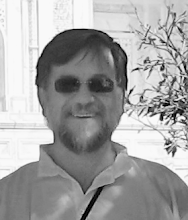“Oh, you're not a Liberian,” the young woman who was checking our passports said, and it made us all chuckle. “No, but I want to be one,” I replied which brought a smile on her face, too. Dr. Ayele, Paul Jones, Anne Cooper and myself–we who make up the St. Anne's delegation–were a lot happier this morning then we were yesterday morning. Monday we arrived at the United Nations airfield in Monrovia at 6:45 with permission to hop a UN helicopter to travel to the city of Harper, Maryland County, in the southeastern corner of the country. There are no roads to speak of from Monrovia to Harper. Two priests I talked to today came back Sunday from a conference, and the last 11 hours of the trip were spent on the back of a pan-pan. So our only prospect was the UN. Dr. Ayele has come to practice two days of desperately needed dental surgery at the hospital here, and we constituted her medical team, which allowed us access to the flight. But there were so many UN military who were going down to the southern boundary of the country to help with the increasingly serious refugee situation with people fleeing The Ivory Coast, that we got bumped and drove to Cuttington University instead (see yesterday's blog).
 Tuesday morning things were different. With fewer military travelers, we got on the helicopter with no problem. Sitting in a Russian military chopper in two lines just like in the war movies, with UN supplies and the personal belongings of NGO workers jammed in between, we donned our orange ear protectors and off we went. Twice we stopped at outposts to drop off personnel and supplies; finally we arrived in Harper. Flanked on two sides by the Atlantic Ocean and with one of the two largest lakes in Liberia, Harper is a beautiful city with tall palm trees and warm sandy beaches. With no one on them.
Tuesday morning things were different. With fewer military travelers, we got on the helicopter with no problem. Sitting in a Russian military chopper in two lines just like in the war movies, with UN supplies and the personal belongings of NGO workers jammed in between, we donned our orange ear protectors and off we went. Twice we stopped at outposts to drop off personnel and supplies; finally we arrived in Harper. Flanked on two sides by the Atlantic Ocean and with one of the two largest lakes in Liberia, Harper is a beautiful city with tall palm trees and warm sandy beaches. With no one on them.
Harper, indeed Maryland County, might as well be on the moon. With the road situation so poor and no commercial airline, Harper is virtually cut off from the rest of the country. Ninety per cent of the goods coming into the city are now cut off because they come from neighboring Ivory Coast, hence the presence of the UN troops; and the border is very, very tight. A suitable road from Monrovia would solve many of the problems of this area, but the will and the funds of the government are not there. All of the Episcopal Churches in the area suffer from this problem as well. Priests don't want to come or stay, and those who are here are worked very hard. There are 39 churches, each one with satellite small chapels and seven, yes seven, priests. Each parish gets communion once every six or seven weeks; the other Sundays lay readers lead Morning Prayer. Yet so many of the people here are full of hope and expectation, and though there are rebel bullet holes in the stained glass and broken pews that were pillaged for cooking fire fuel, there is a love of Jesus in this place that is strong and firm.
Wednesday morning we traveled to the extreme southern end of the country to a place called Cavalla, where the Episcopal Church in Liberia was started in the 1830's. We visited graves of many of the America missionaries and their families who died here in the 1800's. Bishop John W. Payne, a Virginian and graduate of Virginia Theological Seminary (who the Seminary library is named after), was the first missionary bishop and served here for forty years. There are strong ties here between the Virginian Church and the one here in Maryland County, from long ago, and ones that are being formed at this very minute.
